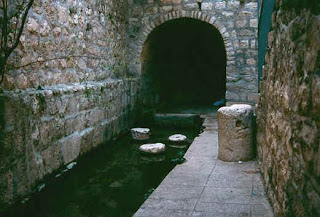Jesus used water in a similar way in the remarkable healing of a man in Jerusalem who had been born blind - John 9. While others used him as a case study for the problem of suffering and sin, Jesus went to work on his healing. He spat on the ground and made a plaster of mud, daubed it on the blind man’s eyes, and sent him to wash in a nearby pool.
 |
| 'Jesus Heals the Blind Man' - El Greco, c. 1570 |
Ah, the wonder of water – and the gift to see behind the surface of things!
Spitting in someone’s face is a sign of vile contempt and, no doubt, like many beggars, this blind man had endured such insult from passers-by. But Jesus, on at least two other occasions, used saliva as he healed people – a deaf mute in Decapolis (Mark 7:33) and a blind man in the Galilee area (Mark 8:23). With Jesus, it wasn’t contempt, but compassion. These peope had special needs, and Jesus used his saliva as well as his touch and voice as a way to connect more deeply, intimately with them.
But why send the man with muddy face, groping his way to a public pool to wash?
 |
| Pool of Siloam - Jerusalem |
In the same way, Jesus was sent from God to open the eyes of the blind, both the physically and spiritually blind. By sending the man to the pool Jesus drew attention to God's sending. The waters of Siloam didn’t wash away this man’s blindness any more than magical powers of Jesus’ saliva did. Jesus used the elements of the natural world along with the man’s faith to reveal the power of the Creator and to bring the gifts of heaven to earth.
John uses this story to show that Jesus is ultimately the light of the world. We are easily blinded by our gifts of sight and self-confidence and certainty; we are often unaware how proud and wrong we are. Like Helen Keller and the blind man in this story, we need someone to bring us the insight to help us connect reality with truth. This story shows us that the only way to correct our spiritual vision is through Jesus.


No comments:
Post a Comment